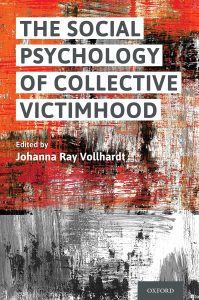 The edited volume, “The Social Psychology of Collective Victimhood”, is now published with Oxford University Press. For a table of contents and more information on the book see here.
The edited volume, “The Social Psychology of Collective Victimhood”, is now published with Oxford University Press. For a table of contents and more information on the book see here.
Category Archives: Publications
New article published: Resistance to collective victimization and oppression
In this review article, co-authored with Mukadder Okuyan and Helin Ünal and now published in Current Opinion in Psychology, we argue for the need to expand social psychological research on resistance in contexts of collective violence and repression – by considering the wide range of resistance strategies people engage in instead of focusing more narrowly on collective action. Theoretical models of resistance should also the specific nature of the context, such as violence and repression, shapes collective resistance. Read the article abstract here.
New article published: Reconciliation Versus Justice? It Depends on the Context: The Role of Symmetric and Asymmetric Violence in Predicting Postconflict Attitudes
In this article, led by Sandra Penić and now published in Social Psychological and Personality Science, we show with two different nationally representative surveys from the former Yugoslavia, and analyses of geo-coded data on violent conflict events, that the relationship between attitudes towards justice and reconciliation depends on the context: In communities more exposed to events of asymmetric violence, support for justice was linked to rejecting reconciliation. Conversely, in communities more exposed to symmetric violence, justice and reconciliation were perceived as compatible. The abstract is available here.
New article published: Through the lens of history: The effects of beliefs about historical victimization on responses to refugees
In this article, led by Zsolt Szabo from ELTE University in Hungary and now published in the International Journal of Intercultural Relations, we examine the relationship between perceptions of historical suffering of Hungarians (in general, and specifically in the 1956 refugee crisis) and attitudes towards refugees coming to Hungary today. The abstract of the article is available here.
New article published: Intersectional Consciousness in Collective Victim Beliefs: Perceived Intragroup Differences Among Disadvantaged Groups
This article, based on parts of Rashmi Nair’s dissertation work and now published in Political Psychology, shows the importance of considering intersectional consciousness when examining collective victim beliefs. We examined these questions among Dalits and Muslims in India of various class backgrounds, considering intersecting identities of class, gender, and caste/religion. Link to the read-only version of the article is here: https://rdcu.be/bAO7d
New review published: Victim and Perpetrator Groups’ Divergent Perspectives on Collective Violence: Implications for Intergroup Relations
This review article, co-authored with Rezarta Bilali (NYU Steinhardt) and now published in Advances in Political Psychology, juxtaposes and outlines the different ways in which members of (former) victim and perpetrator groups construe the same events of collective violence, explaining the often entrenched conflicts over what happened and whether and how the events should be commemorated and redressed. For the abstract see https://onlinelibrary.wiley.com/doi/abs/10.1111/pops.12570
